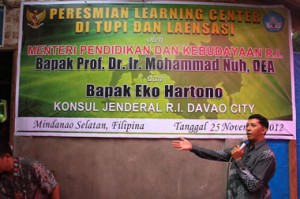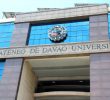
ANOTHER INDONESIAN SCHOOL. Simon Adare of the Sekolah Indonesia Davao leads the opening rites of the Peresmian Learning Center in Tupi, South Cotabato Sunday. Indonesia now runs three schools in the Philippines, one in Davao and another in Glan, Sarangani. (davaotoday.com photo by Mick M. Basa)
By MICK M. BASA
Davao Today
TUPI, South Cotabato, Philippines — The Indonesian government has opened two schools in Mindanao in a bid to provide access to education for its descendants especially those living in coastal areas.
The Peresmian Learning Centre in Tupi, South Cotabato and in Glan, Sarangani cater to Indonesian secondary students. A total of 148 students have been enrolled to the schools since they were opened this month.
Indonesia now runs three schools in Mindanao, the first one being based in Davao. Its secondary education system requires students seven academic years in school.
“We have to establish the learning centers as we know the Indonesians living here have limited access to basic needs such as education,” Muhammad Nuh, Indonesia’ s Education Minister, told davaotoday.com in an interview Sunday.
Nuh flew to the Philippines Saturday to join the formal opening of the schools over the weekend.
The Indonesian Ministry of Education has poured PHP 300,000 (USD 7,294) to construct the schools built in concrete and wood. Teachers deployed in the said schools earn PHP 4,000 (USD 97.25) per month, according to Soehardi, head of the socio-cultural affairs of the Indonesian Consulate in Davao.
The schools hold weekly classes using a learning module, said Paristianti Nuwardani, Education and Cultural Attache of the Indonesian Embassy in Manila.
There is an increasing demand of Indonesian schools in the Philippines as many of its migrants living here desire a way out of poverty.
“We need to uplift their lives. They need to have good citizenship. Living in harmony with the Filipinos is an important thing so they should be educated,” Nuh said.
Non-government organization Pasali Philippines Foundation has recorded 6,000 people of Indonesian descent living in Mindanao. Thirty percent of them don’t have legal staying permit from the Philippines, which leaves them to limited protection from both Indonesian and Philippine governments. (Mick M. Basa/davaotoday.com)










